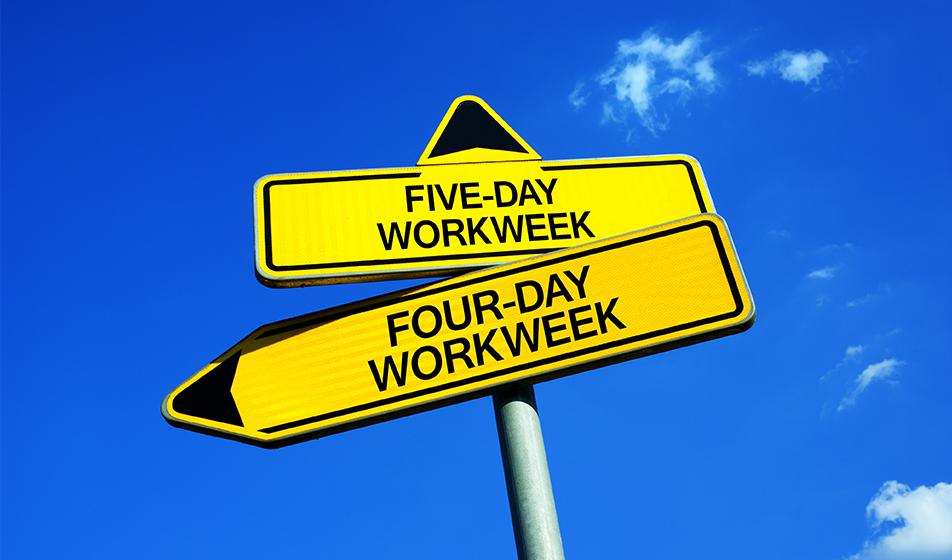Should Nigeria Adopt a Four-Day Work Week?

Create a mental image of any major city in the country. I choose Lagos (for obvious reasons). It is a Monday morning in Lagos and commuters have started to pour into packed yellow buses since 5am (in an attempt to beat the crazy city's traffic) clinging to naked seat bodice as the driver weaves through traffic, changing lanes like a man possessed.
By the time many arrive at their workplaces, they have already spent two hours navigating potholes, fumes, and the morning chaos. And this is just the beginning of a five-day cycle that often leaves workers drained by Friday evening, only to reset by Sunday night.
Some countries around the world, however, adopt the four-day work week, and it is not long they started to see results.
Iceland piloted it and found that productivity didn’t decline, if anything, it went up. The UK recently concluded its largest trial, where most companies decided to stick with the new schedule because workers were happier and output remained stable. Even South Africa has dipped its toes into the experiment.
Which raises the ultimate question: should Nigeria, with its gruelling work culture, dare to try the same?

PC: Google
The Global Experiment
The idea of reducing the work week from five days to four is not new, but it is gaining momentum. In 2021, Iceland conducted one of the most extensive trials involving 2,500 workers across various sectors. The results were striking as stress levels dropped, burnout declined, and productivity stayed consistent.
In Japan, a nation synonymous with workaholism, Microsoft experimented with a four-day schedule and reported a 40% boost in productivity. In the UK, where more than 60 companies participated in a recent trial, workers reported better mental health, and businesses noticed no significant dip in profit margins.
Globally, the argument remains simple. A team of happy workers will always produce better results. Instead of chaining employees to desks for long hours, giving them time to rest, recharge, and live fuller lives will make their efficiency skyrocket.
Nigeria’s Reality Check
But Nigeria is not Iceland, nor is it the UK. Here, the work environment is shaped by unique conditions.
For starters, the average Nigerian worker spends several hours in traffic each day. Lagosians joke that their work week is not 40 hours but 60, with commuting eating into personal time. Offices are often powered by generators because of erratic electricity supply, making productivity a battle against noise and diesel costs.
There is also the cultural element. In many Nigerian offices, productivity is measured by “face time” (being physically present at work) rather than actual output. Leaving before 5pm, even after finishing one’s tasks, is seen as laziness. Add to this the fact that Nigeria’s economy relies heavily on informal labour such as markets, transport, artisans, sectors that don’t exactly run on structured calendars and even the five-day work policy plan.
Would shaving off one day from the work week truly benefit the average Nigerian worker, or would it simply reduce already limited earnings?

Pc: Google
Potential Benefits
Despite the challenges, the idea isn’t without promise for Nigeria.
If offices closed one extra day a week, the daily gridlock in cities like Lagos, Abuja, and Port Harcourt could ease significantly. Fewer cars mean less fuel consumption and reduced air pollution which is a win for workers’ pockets and the environment.
It is no news that Nigeria rarely acknowledges the mental health issues and even totally ignore the toll of overwork. Depression, anxiety, and burnout are often dismissed as “Western problems,” yet many Nigerian workers live them daily. An extra day of rest could allow people to reconnect with family, pursue hobbies, or simply sleep and recover lost hours.
We can agree from the global experiment that when workers are less exhausted, they can focus better. Studies abroad suggest that people often waste hours in offices pretending to work because they are drained. A shorter week might mean Nigerian workers bring more energy and creativity to their jobs.
The four-day model could push Nigeria’s growing tech sector toward efficiency-based performance. Remote and freelance jobs thrive on output, not hours clocked in. If embraced, it could normalize a culture where work is judged by results rather than presence.
The Skepticism and Risks
Of course, not everyone is convinced.
Many Nigerians worry about public service delivery. Imagine a four-day work week at banks, long queues on the remaining days could worsen. Even public holidays on a week day is a nightmare for Nigerians when it comes to the banking sector, speak more of shaving down the five-day work plan.
Or in schools where students would lose valuable contact hours with teachers. And in hospitals: could fewer shifts compromise patient care?
Another fear is wage cuts. Employers may see the reduced days as justification to slash salaries, especially in the private sector where labour protections are weak. For workers already stretched thin by inflation, this would be disastrous.
There is also skepticism about whether Nigerian workers would actually enjoy the benefits. If offices closed on Fridays, would that extra day simply turn into another hustle, market runs, side gigs, or family obligations? The informal economy never sleeps, and workers might find themselves even busier outside their 9-to-5 jobs.
Is There A Middle Ground?
Perhaps the answer is not a rigid four-day week but a flexible approach. Some sectors could adopt remote days instead of outright closures. A bank might allow digital banking teams to work from home one day a week while branches remain open. Schools could experiment with blended learning, introducing online classes once a week to supplement teaching.
Nigeria might also pilot the model in government ministries or select companies, gathering data before making bigger commitments. This way, the system adapts to Nigeria’s peculiar realities rather than importing a Western model wholesale.
Another compromise is flexi-time: workers still put in the same total hours but distribute them differently. For example, 10-hour days from Monday to Thursday, leaving Friday free. It is not perfect, but it balances efficiency with cultural expectations.
Conclusion
The debate about a four-day work week in Nigeria is ultimately a debate about what we value in the workplace. Do we measure dedication by the number of hours spent in the office, or by the quality of work delivered?
Globally, the evidence suggests that less can be more, that rest fuels creativity and productivity. Nigeria’s context, however, makes the transition more complicated. With the informal economy and infrastructural deficits placing its hands on the table, the shift in position is slow and rigorous.
Yet, the conversation is worth having. At its heart, the four-day work week is not just about shorter hours but about rethinking work itself. For a country where overwork and underpay have become normal, daring to imagine a different rhythm might be the first step toward a healthier, more productive Nigeria.
Recommended Articles
There are no posts under this category.You may also like...
Bundesliga's New Nigerian Star Shines: Ogundu's Explosive Augsburg Debut!

Nigerian players experienced a weekend of mixed results in the German Bundesliga's 23rd match day. Uchenna Ogundu enjoye...
Capello Unleashes Juventus' Secret Weapon Against Osimhen in UCL Showdown!

Juventus faces an uphill battle against Galatasaray in the UEFA Champions League Round of 16 second leg, needing to over...
Berlinale Shocker: 'Yellow Letters' Takes Golden Bear, 'AnyMart' Director Debuts!

The Berlin Film Festival honored
Shocking Trend: Sudan's 'Lion Cubs' – Child Soldiers Going Viral on TikTok

A joint investigation reveals that child soldiers, dubbed 'lion cubs,' have become viral sensations on TikTok and other ...
Gregory Maqoma's 'Genesis': A Powerful Artistic Call for Healing in South Africa

Gregory Maqoma's new dance-opera, "Genesis: The Beginning and End of Time," has premiered in Cape Town, offering a capti...
Massive Rivian 2026.03 Update Boosts R1 Performance and Utility!

Rivian's latest software update, 2026.03, brings substantial enhancements to its R1S SUV and R1T pickup, broadening perf...
Bitcoin's Dire 29% Drop: VanEck Signals Seller Exhaustion Amid Market Carnage!

Bitcoin has suffered a sharp 29% price drop, but a VanEck report suggests seller exhaustion and a potential market botto...
Crypto Titans Shake-Up: Ripple & Deutsche Bank Partner, XRP Dips, CZ's UAE Bitcoin Mining Role Revealed!

Deutsche Bank is set to adopt Ripple's technology for faster, cheaper cross-border payments, marking a significant insti...
